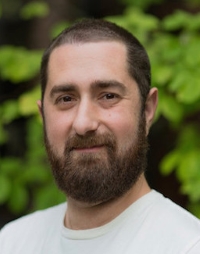Social Work Doctoral Student Spotlight: Using methodological innovations to advance research in child welfare

Bryan Victor
Using methodological innovations to advance research in child welfare
Professional Biography
Bryan is interested in the impact of childhood exposure to domestic violence and subsequent child welfare involvement, as well as the use of data science methods within social work research. The majority of his direct practice has been with LGBTQ individuals in major urban centers, particularly those experiencing abuse, discrimination or physical or mental health crises. After earning a bachelor's degree in social relations and social policy from Michigan State University, he worked as an AmeriCorps volunteer for Chicago-based Howard Brown Health, providing HIV prevention and test counseling. After six months in South America learning Spanish, he served as a residential survivor advocate in the safe home of Boston's LGBTQ Domestic Violence Project, where he helped gay and lesbian clients fleeing domestic abuse. Bryan then earned his M.S.W. at the University of Michigan, during which time he obtained field experience with Wayne County's First Step (as a community-based advocate for survivors of sexual and domestic violence) and with Catholic Social Services of Washtenaw County's Alternatives to Domestic Aggression (as a batterer intervention group facilitator with male perpetrators of violence against intimate partners). For one year Bryan worked on a clinical trial for an HIV prevention technology with the Wayne State School of Medicine before joining Detroit-based Equality Michigan, working first as victim services advocate and then as HIV policy coordinator. Since 2015, he has devoted himself full-time to his doctoral studies at Wayne State. He served as a graduate research fellow with the Merrill Palmer Skillman Institute in 2015-16 and has accepted a predoctoral training fellowship at the University of Michigan School of Social Work's Child and Adolescent Data Lab during the 2016-17 academic year.
Research/Dissertation
Bryan's predoctoral training fellowship will allow him to explore two key research interests for the purposes of his dissertation: the use of data science methods in social work research and the impact of child welfare involvement following removal from the home due to domestic violence. Through cooperative agreements with the State of Michigan, Bryan and his colleagues will blend longitudinal data from the state's child welfare and juvenile justice systems along with Medicaid claims data to determine how and when children are removed from the home when allegations of domestic violence are substantiated and whether removal has implications for their long-term outcomes with respect to education, health, and juvenile justice involvement.
Why It's Important
"Domestic violence is a leading cause of children's removal from the home, however we need to understand if there are circumstances under which a different intervention might be better for them," Bryan said. "For example, would we see better outcomes if we were to remove the perpetrator of the violence from the home rather than the child?" Often, Bryan noted, the parent who is not the perpetrator is accused of failure to protect, leading caseworkers to consider both parties unfit to exercise custody; however, more data is needed to understand these situations and to develop sounder policies and practices. "This area of the research that looks at outcomes across systems is relatively new and it's largely because we haven't had the ability to blend large data sets," Bryan said. "The field is benefiting from the development of software and technologies that support this type of data integration." Bryan is doing his part to move the field forward: last year, he coauthored a paper in Research on Social Work Practice called "Laying the foundations for scientometric research" that describes open source software he wrote with University of Michigan colleagues to facilitate the aggregation of metadata from thousands of research articles.
Faculty Support
Bryan praises the School of Social Work's Ph.D. Program for the high level of interest faculty take in students' preparation for post-doctoral careers. "There is a strong commitment to mentoring and to students' participation in faculty research projects "" from data collection to data analysis to publishing," Bryan said. As a Merrill Palmer research fellow he has worked closely with his advisor, Associate Social Work Professor Poco Kernsmith, and with Assistant Social Work Professor for Research Joanne Smith-Darden on their federally funded study of predictors of teen dating violence [https://wayne.edu/newsroom/release/2012/09/13/cdc-funds-wayne-state-university-research-to-understand-prevent-teen-dating-violence-4642]. He has also published on maternal substance abuse behaviors with Assistant Professor Suzanne Brown, contributed to work by the school's Substance Abuse, Violence & Mental Health Research Collaborative (led by Brown and Assistant Social Work Professor Stella Resko), and participated in research on senior housing transitions by the school's relocation lab (headed by Assistant Professor Tam Perry). Said Kernsmith, "Bryan is committed to addressing important social issues, and his work has the potential to have significant implications for social work policy and practice. His approach to research is innovative and demonstrates his ability to address issues in creative ways. He has a natural intellectual curiosity and always strives to take advantage of opportunities to learn and collaborate with peers and faculty."
To read about other social work doctoral students and the research they are pursuing, click here: http://socialwork.wayne.edu/phd/student-spotlight.php